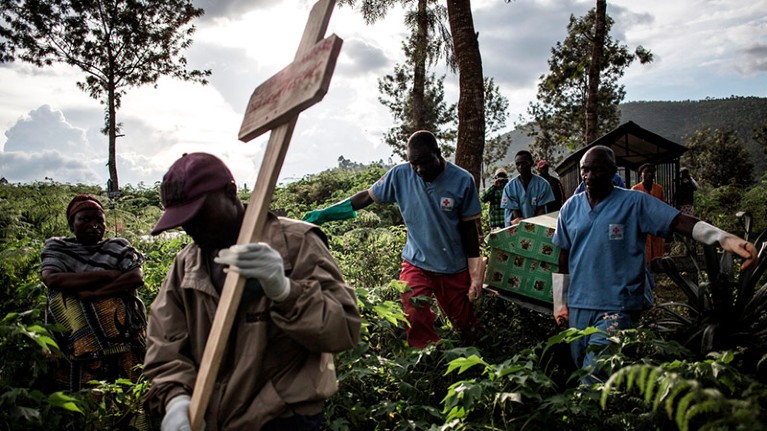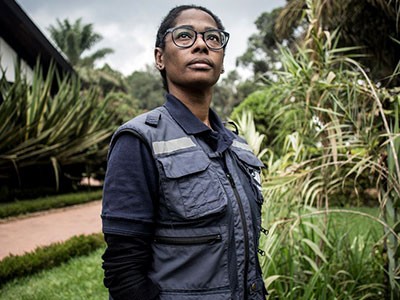
International support is essential if health workers are to continue fighting the Ebola outbreak.Credit: John Wessels/AFP/Getty
Over the past few weeks, Nature has been reporting from the frontline of efforts by the Democratic Republic of the Congo (DRC) to combat an escalating Ebola outbreak in a war zone.
Since August 2018, some 2,408 people are thought to have contracted the virus and more than 1,600 have died from the disease. Our reporter visited Ebola responders working with the World Health Organization in the cities of Beni, Butembo and Katwa in North Kivu, an eastern province of the DRC. Those responding to the outbreak are treating people with Ebola, tracking down their trail of contacts, offering immunization with a new vaccine, and keeping track of hundreds of informal shops that treat people with an array of medicines and herbs.
These tasks are complicated because many people do not trust the Ebola responders’ intentions. This distrust stems from decades of violence, political instability and the neglect of primary care in a region that has been left fraught by 25 years of conflict.
Meet the Ebola workers battling a virus in a war zone
Ongoing attacks and kidnappings in areas where Ebola is spreading mean most international aid groups have many fewer staff on the ground than do the WHO and the DRC Ministry of Health. Staff of both have been met with bullets, grenades and stones, but they remain dedicated to ending the outbreak. If the purse strings tighten, however, and the WHO cannot continue its work, the outbreak will almost certainly pick up speed. It’s only a matter of time until the virus crosses borders.
And yet the governments of the world’s seven largest economies have not committed sufficient funds to the WHO. Between February and June, the organization requested US$98 million for the Ebola response; as Nature went to press, the agency had received less than half of that sum. Its effort remains afloat because the WHO has dipped into funds from some of its other budgets.
Among the G7 nations, Germany and the United Kingdom are on track with combined pledges of nearly $16 million to the WHO’s Ebola response in North Kivu this year. The Bill and Melinda Gates Foundation in Seattle, Washington, and other non-governmental donors have contributed almost $8 million this year. But the United States, Canada, France, Italy and Japan have not contributed their share. And because the United States is relied upon as the world’s biggest health-emergency funder, its shortfall is disconcerting. The United States is understood to have contributed $31 million to the Ebola response this year, and beneficiaries have included aid groups and other United Nations agencies — but not the WHO.
There are a few possible explanations for this shortcoming. The first is unspoken, but was true of the world’s largest outbreak of the disease in West Africa — Ebola has not yet spread to rich countries. Another is that the WHO has been criticized for not having the outbreak fully under control despite its courageous efforts. In response to such comments, the WHO began sharing more responsibilities with other UN agencies in May, recognizing that the situation requires not only biomedical assistance but also political and humanitarian expertise.
Concerns about the WHO’s approach to accounting could be another reason that countries such as the United States are holding back. On 26 June, at a panel at the American Enterprise Institute, a think tank in Washington DC, Tim Ziemer, a senior administrator at the US Agency for International Development, suggested the WHO has not been sufficiently transparent about how its funds are spent.
Demands for transparency are just, but they’re no reason for the US government or those of other countries to withhold funds at this critical juncture. Institutions such as the World Bank can audit the WHO’s response while the agency keeps its focus on the ground. After all, its efforts have often paid off when they are sustained and not interrupted by violence.
At last month’s G20 summit in Japan, high-income countries, including the United States, declared their full support for the Ebola response. They must now make good on that promise to the WHO. If countries procrastinate, the world risks a repeat of the 2014–16 Ebola outbreak, in which a slow response contributed to the loss of more than 11,300 lives in Africa and a cost to taxpayers of more than $3 billion. The WHO needs just a fraction of this to prevent a horrific repeat of history.

 The doctor who beat Ebola – and inspires others to care for the sick
The doctor who beat Ebola – and inspires others to care for the sick
 Meet the Ebola workers battling a virus in a war zone
Meet the Ebola workers battling a virus in a war zone
 ‘The world has never seen anything like this’: WHO chief on battling Ebola in a war zone
‘The world has never seen anything like this’: WHO chief on battling Ebola in a war zone







